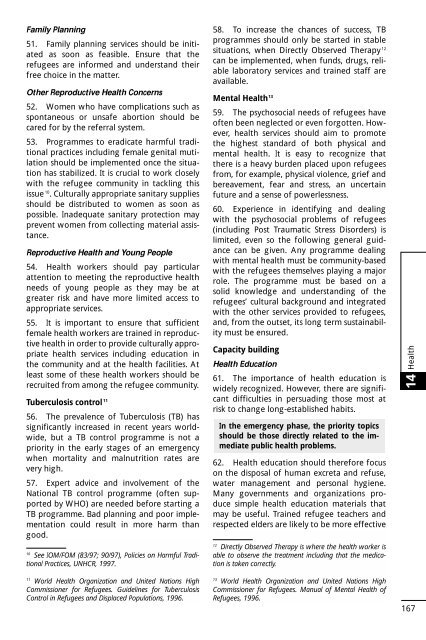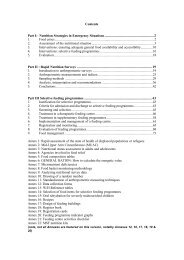UNHCR Handbook for Emergencies - UNHCR eCentre
UNHCR Handbook for Emergencies - UNHCR eCentre
UNHCR Handbook for Emergencies - UNHCR eCentre
You also want an ePaper? Increase the reach of your titles
YUMPU automatically turns print PDFs into web optimized ePapers that Google loves.
Family Planning<br />
51. Family planning services should be initiated<br />
as soon as feasible. Ensure that the<br />
refugees are in<strong>for</strong>med and understand their<br />
free choice in the matter.<br />
Other Reproductive Health Concerns<br />
52. Women who have complications such as<br />
spontaneous or unsafe abortion should be<br />
cared <strong>for</strong> by the referral system.<br />
53. Programmes to eradicate harmful traditional<br />
practices including female genital mutilation<br />
should be implemented once the situation<br />
has stabilized. It is crucial to work closely<br />
with the refugee community in tackling this<br />
issue 10 . Culturally appropriate sanitary supplies<br />
should be distributed to women as soon as<br />
possible. Inadequate sanitary protection may<br />
prevent women from collecting material assistance.<br />
Reproductive Health and Young People<br />
54. Health workers should pay particular<br />
attention to meeting the reproductive health<br />
needs of young people as they may be at<br />
greater risk and have more limited access to<br />
appropriate services.<br />
55. It is important to ensure that sufficient<br />
female health workers are trained in reproductive<br />
health in order to provide culturally appropriate<br />
health services including education in<br />
the community and at the health facilities. At<br />
least some of these health workers should be<br />
recruited from among the refugee community.<br />
Tuberculosis control 11<br />
56. The prevalence of Tuberculosis (TB) has<br />
significantly increased in recent years worldwide,<br />
but a TB control programme is not a<br />
priority in the early stages of an emergency<br />
when mortality and malnutrition rates are<br />
very high.<br />
57. Expert advice and involvement of the<br />
National TB control programme (often supported<br />
by WHO) are needed be<strong>for</strong>e starting a<br />
TB programme. Bad planning and poor implementation<br />
could result in more harm than<br />
good.<br />
10 See IOM/FOM (83/97; 90/97), Policies on Harmful Traditional<br />
Practices, <strong>UNHCR</strong>, 1997.<br />
11 World Health Organization and United Nations High<br />
Commissioner <strong>for</strong> Refugees. Guidelines <strong>for</strong> Tuberculosis<br />
Control in Refugees and Displaced Populations, 1996.<br />
58. To increase the chances of success, TB<br />
programmes should only be started in stable<br />
situations, when Directly Observed Therapy 12<br />
can be implemented, when funds, drugs, reliable<br />
laboratory services and trained staff are<br />
available.<br />
Mental Health13 59. The psychosocial needs of refugees have<br />
often been neglected or even <strong>for</strong>gotten. However,<br />
health services should aim to promote<br />
the highest standard of both physical and<br />
mental health. It is easy to recognize that<br />
there is a heavy burden placed upon refugees<br />
from, <strong>for</strong> example, physical violence, grief and<br />
bereavement, fear and stress, an uncertain<br />
future and a sense of powerlessness.<br />
60. Experience in identifying and dealing<br />
with the psychosocial problems of refugees<br />
(including Post Traumatic Stress Disorders) is<br />
limited, even so the following general guidance<br />
can be given. Any programme dealing<br />
with mental health must be community-based<br />
with the refugees themselves playing a major<br />
role. The programme must be based on a<br />
solid knowledge and understanding of the<br />
refugees’ cultural background and integrated<br />
with the other services provided to refugees,<br />
and, from the outset, its long term sustainability<br />
must be ensured.<br />
Capacity building<br />
Health Education<br />
61. The importance of health education is<br />
widely recognized. However, there are significant<br />
difficulties in persuading those most at<br />
risk to change long-established habits.<br />
In the emergency phase, the priority topics<br />
should be those directly related to the immediate<br />
public health problems.<br />
62. Health education should there<strong>for</strong>e focus<br />
on the disposal of human excreta and refuse,<br />
water management and personal hygiene.<br />
Many governments and organizations produce<br />
simple health education materials that<br />
may be useful. Trained refugee teachers and<br />
respected elders are likely to be more effective<br />
12 Directly Observed Therapy is where the health worker is<br />
able to observe the treatment including that the medication<br />
is taken correctly.<br />
13 World Health Organization and United Nations High<br />
Commissioner <strong>for</strong> Refugees. Manual of Mental Health of<br />
Refugees, 1996.<br />
Health<br />
14<br />
167



